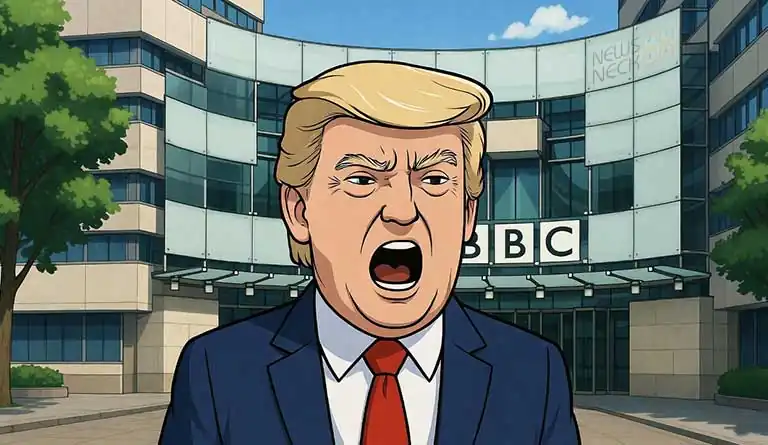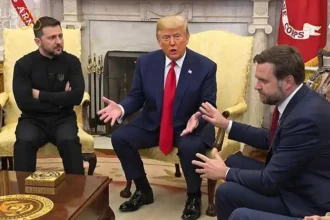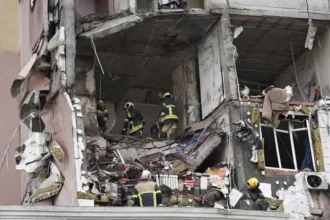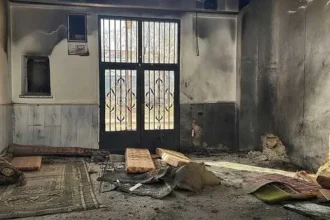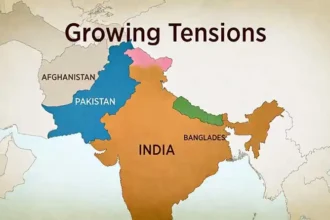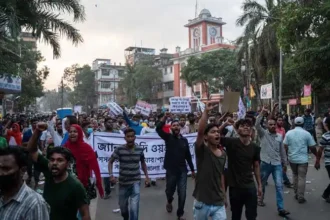The phone kept ringing at the BBC headquarters in London. Nobody wanted to answer it. Everyone knew what was coming.
On the other side of the Atlantic, aboard Air Force One, President Donald Trump was talking to reporters. And he was angry.
“We’ll sue them for anywhere between $1 billion and $5 billion,” Trump said, his voice cutting through the hum of the presidential plane. “Probably sometime next week.”
The BBC—the British Broadcasting Corporation, an institution that’s been around for over a century—was facing the fight of its life.
How It All Started
Let’s go back to understand what sparked this fire. The BBC made a documentary. Not just any documentary, but one about January 6, 2021—the day Trump’s supporters stormed the U.S. Capitol building in a scene that shocked the world.
The documentary aired on “Panorama,” the BBC’s most important news program. Millions of people watched. And in that documentary, the BBC showed Trump giving a speech.
But here’s where everything went wrong: they edited the speech. They took three different parts from different moments and spliced them together—cut and pasted them like pieces of a puzzle—to create one continuous clip.
The problem? Those pieces weren’t supposed to fit together. One part of the speech came from nearly an hour after another part. By putting them together, the BBC made it look like Trump was saying something he hadn’t actually said in that order.
Trump’s lawyers were furious. They said the edit made Trump look like he was encouraging the riot, when in reality, his full speech told a different story.
You Might Like it: Trump Eyes F-35 Fighter Jet Deal With Saudi Arabia
When Sorry Isn’t Enough
The BBC realized they had made a mistake. On Thursday, the BBC’s chairman, Samir Shah, sent a personal apology letter to the White House. He called the edit “an error of judgement.”
An error of judgement. Those three words were supposed to fix everything. They didn’t.
Trump wasn’t buying it. “When you say it’s unintentional, I guess if it’s unintentional, you don’t apologize,” he told GB News, a British television channel. His logic was clear: if you’re apologizing, you know you did something wrong. And if you know you did something wrong, it wasn’t really an accident.
“I made a beautiful statement, and they made it into a not beautiful statement,” Trump said. His frustration was visible even through the television screen.
He went further, using language that has become his signature. “Fake news was a great term, except it’s not strong enough. This is beyond fake, this is corrupt.”
Corrupt. That’s not a word you throw around lightly when talking about one of the world’s most respected news organizations.
The $5 Billion Question
Trump’s lawyers had originally demanded $1 billion. But by Friday, as Trump sat on Air Force One heading to Florida for the weekend, that number had grown. Now he was talking about $5 billion.
To put that in perspective: $5 billion is more money than most people will see in a hundred lifetimes. It’s the kind of number that makes accountants dizzy and lawyers start working overtime.
The BBC insisted there was no legal basis for Trump’s claim. They said they had apologized. They said they wouldn’t rebroadcast the documentary. They said the edit was a mistake, not intentional defamation.
But Trump wasn’t interested in their explanations. “I think I have to do that,” he said about the lawsuit. “They’ve even admitted that they cheated. They changed the words coming out of my mouth.”
A Crisis Like No Other
Inside the BBC, panic had set in. This wasn’t just about one documentary anymore. This had become the broadcaster’s biggest crisis in decades.
Two of the BBC’s most senior leaders—Director General Tim Davie and Head of News Deborah Turness—had already resigned. They didn’t wait to be fired. They didn’t try to ride out the storm. They packed their offices and left.
Their resignations came amid accusations of bias and editing failures. It wasn’t just Trump’s speech anymore. People started looking at other BBC programs. Another show called “Newsnight” was now under investigation for similar editing issues.
The BBC, an institution founded in 1922 that had survived world wars and countless political scandals, was bleeding. And the wound was self-inflicted.
The Political Earthquake
In London, British Prime Minister Keir Starmer was caught in an awkward position. He had built a solid relationship with Trump—something not easy to do when you’re leading a left-leaning government and Trump is, well, Trump.
Trump told reporters that Starmer had tried to reach him and was “very embarrassed” by the incident. Trump said he planned to call Starmer over the weekend to discuss it.
In Parliament, Starmer defended the BBC while also acknowledging its failures. “I support a strong and independent BBC,” he said, “but the broadcaster must get its house in order.”
He pointed at Conservative lawmakers—the opposition party—and added, “Some would rather the BBC didn’t exist. Some of them are sitting up there. I’m not one of them.”
It was a delicate dance. Support the BBC without defending its mistakes. Criticize the error without destroying an institution.
The Money Problem
Here’s where things get even more complicated. The BBC isn’t funded like American news networks. It doesn’t rely on advertising or billionaires. Instead, British citizens pay a mandatory license fee—basically a tax—to fund the BBC.
If Trump wins his lawsuit, where would the BBC get $5 billion? From the British taxpayers who fund it through their license fees?
Former media minister John Whittingdale voiced what many Brits were thinking: there would be “real anger” if ordinary people’s money was used to pay Trump’s damages.
Imagine paying your TV license fee every year, and then finding out that money went to settle a lawsuit with an American president. That’s not exactly what people signed up for.
What Comes Next
Trump said the lawsuit would likely be filed next week. The BBC said it rejected the defamation claim. Both sides are dug in, neither willing to back down.
This isn’t just about money or even about one edited video. It’s about trust. About truth. About who gets to tell the story and how they tell it.
Trump has always had a complicated relationship with the media. He coined the term “fake news” and used it like a weapon against outlets he disagreed with. Now he’s taking that battle international, going after one of the world’s most established broadcasters.
The BBC, meanwhile, is fighting for its reputation and its future. One editing mistake has cost them their top leaders, their credibility, and potentially billions of dollars.
As Trump’s plane landed in Florida on Friday, the BBC’s crisis was just beginning. Lawyers on both sides were probably already working through the weekend, preparing for a legal battle that could reshape how news organizations operate.
“This is beyond fake, this is corrupt,” Trump had said.
The BBC called it “an error of judgement.”
A courtroom might soon decide who’s right.


